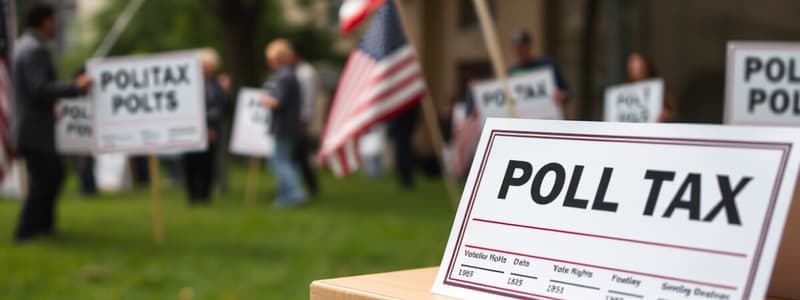Podcast
Questions and Answers
What was the main purpose of the poll tax in southern states after the Civil War?
What was the main purpose of the poll tax in southern states after the Civil War?
- To raise government revenue for public services
- To disenfranchise African American voters (correct)
- To simplify the voting process
- To encourage higher voter participation
Which amendment abolished slavery in the United States?
Which amendment abolished slavery in the United States?
- 24th Amendment
- 13th Amendment (correct)
- 19th Amendment
- 15th Amendment
What major change did the 24th Amendment bring about regarding voting?
What major change did the 24th Amendment bring about regarding voting?
- It introduced a sliding scale tax for voters.
- It eliminated the requirement of a poll tax for voting. (correct)
- It granted voting rights to women.
- It allowed states to impose any fee for voting.
How did the poll tax disproportionately affect certain voters?
How did the poll tax disproportionately affect certain voters?
What broader movement was the 24th Amendment a part of?
What broader movement was the 24th Amendment a part of?
Flashcards are hidden until you start studying
Study Notes
Poll Tax and Its Historical Impact
- A poll tax was a fee required from every eligible voter before they could cast their vote.
- Although a flat fee, the burden was disproportionately heavy on low-income individuals, particularly affecting impoverished communities.
- Southern states utilized the poll tax to disenfranchise African American citizens post-Civil War, exploiting a loophole despite federal mandates.
Constitutional Amendments Related to Voting Rights
- The 13th Amendment abolished slavery across the United States.
- The 15th Amendment prohibited voting discrimination based on race, aiming to secure voting rights for African Americans.
- Many African Americans, lacking financial resources, found the poll tax an insurmountable barrier to voting, rendering their legal rights ineffective.
Jim Crow Laws and Discriminatory Practices
- The poll tax was part of Jim Crow laws, designed to restrict the rights and freedoms of African Americans in the South.
- Identification of the poll tax as generally applicable justified its legality, despite its racially discriminatory effects.
The 24th Amendment and Voting Rights Advancement
- Ratified on January 23, 1964, the 24th Amendment abolished the poll tax across the United States and its territories.
- The amendment emerged during the Civil Rights Movement, a period marked by significant legislative efforts to combat discrimination.
- Specifically prohibited any government level from implementing a poll tax or requiring payment of any tax as a condition for voting in federal elections.
Studying That Suits You
Use AI to generate personalized quizzes and flashcards to suit your learning preferences.




